3.商务英语写作 第三章
- 格式:pptx
- 大小:233.72 KB
- 文档页数:37
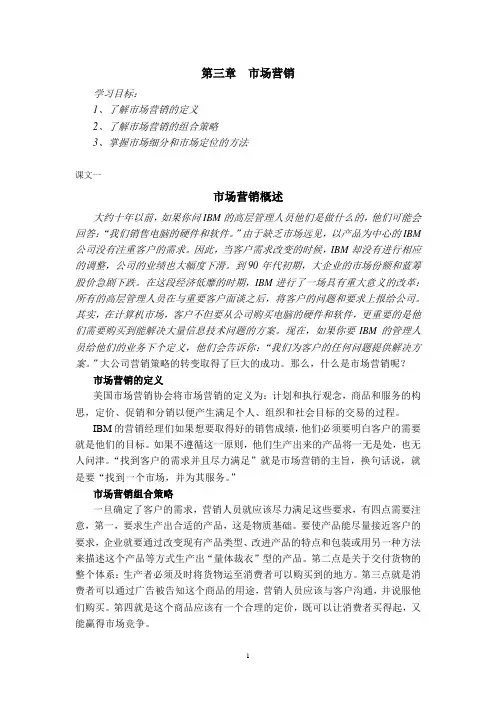
第三章市场营销学习目标:1、了解市场营销的定义2、了解市场营销的组合策略3、掌握市场细分和市场定位的方法课文一市场营销概述大约十年以前,如果你问IBM的高层管理人员他们是做什么的,他们可能会回答:“我们销售电脑的硬件和软件。
”由于缺乏市场远见,以产品为中心的IBM 公司没有注重客户的需求。
因此,当客户需求改变的时候,IBM却没有进行相应的调整,公司的业绩也大幅度下滑。
到90年代初期,大企业的市场份额和蓝筹股价急剧下跌。
在这段经济低靡的时期,IBM进行了一场具有重大意义的改革:所有的高层管理人员在与重要客户面谈之后,将客户的问题和要求上报给公司。
其实,在计算机市场,客户不但要从公司购买电脑的硬件和软件,更重要的是他们需要购买到能解决大量信息技术问题的方案。
现在,如果你要IBM的管理人员给他们的业务下个定义,他们会告诉你:“我们为客户的任何问题提供解决方案。
”大公司营销策略的转变取得了巨大的成功。
那么,什么是市场营销呢?市场营销的定义美国市场营销协会将市场营销的定义为:计划和执行观念,商品和服务的构思,定价、促销和分销以便产生满足个人、组织和社会目标的交易的过程。
IBM的营销经理们如果想要取得好的销售成绩,他们必须要明白客户的需要就是他们的目标。
如果不遵循这一原则,他们生产出来的产品将一无是处,也无人问津。
“找到客户的需求并且尽力满足”就是市场营销的主旨,换句话说,就是要“找到一个市场,并为其服务。
”市场营销组合策略一旦确定了客户的需求,营销人员就应该尽力满足这些要求,有四点需要注意,第一,要求生产出合适的产品,这是物质基础。
要使产品能尽量接近客户的要求,企业就要通过改变现有产品类型、改进产品的特点和包装或用另一种方法来描述这个产品等方式生产出“量体裁衣”型的产品。
第二点是关于交付货物的整个体系:生产者必须及时将货物运至消费者可以购买到的地方。
第三点就是消费者可以通过广告被告知这个商品的用途,营销人员应该与客户沟通,并说服他们购买。
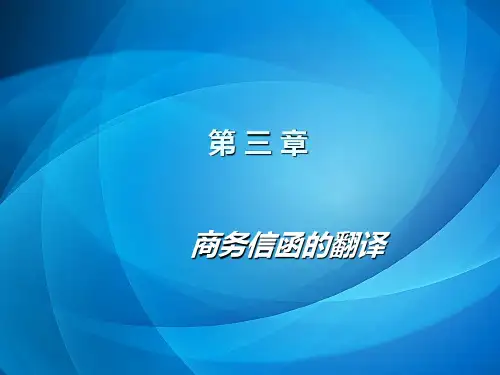
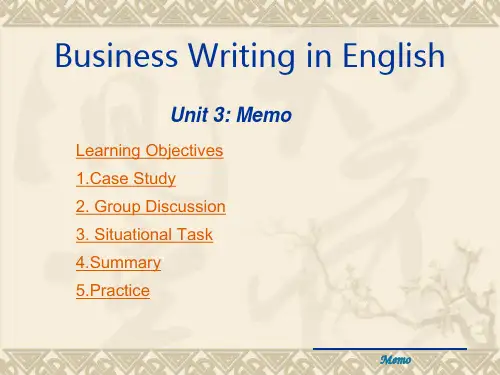

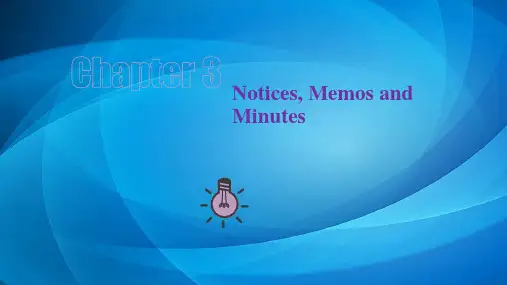
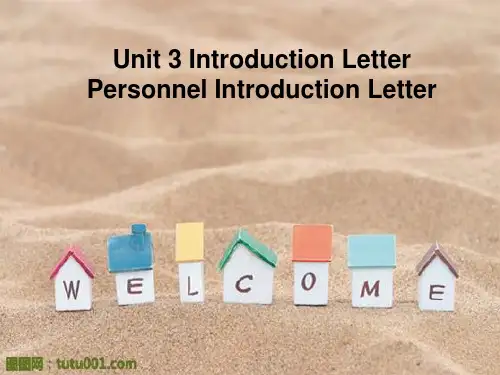
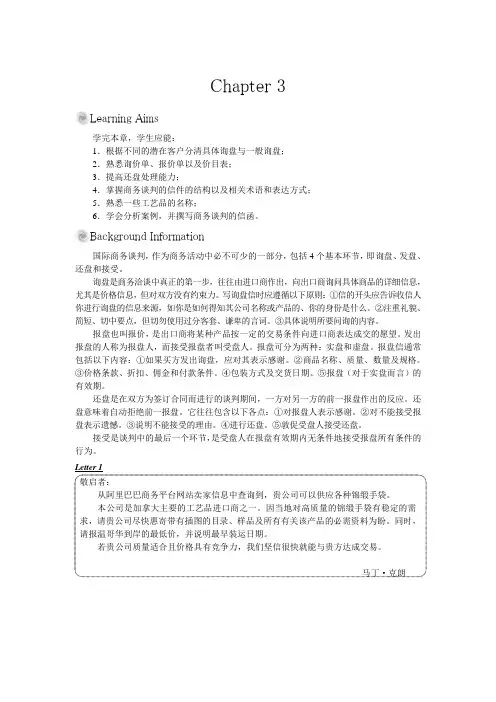

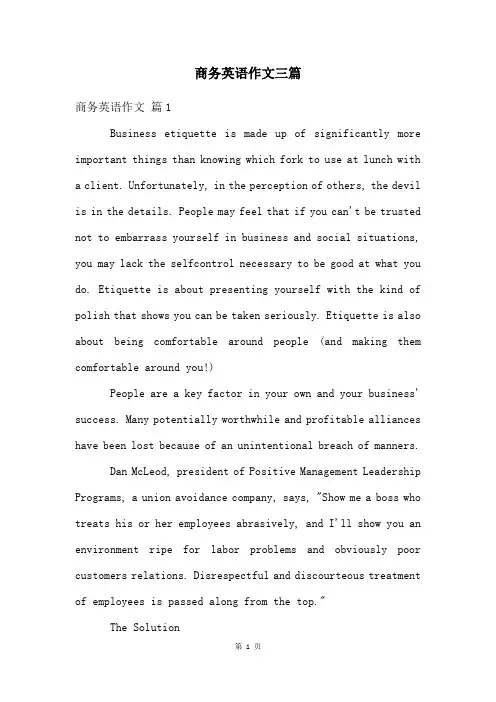
商务英语作文三篇商务英语作文篇1Business etiquette is made up of significantly more important things than knowing which fork to use at lunch with a client. Unfortunately, in the perception of others, the devil is in the details. People may feel that if you can't be trusted not to embarrass yourself in business and social situations, you may lack the selfcontrol necessary to be good at what you do. Etiquette is about presenting yourself with the kind of polish that shows you can be taken seriously. Etiquette is also about being comfortable around people (and making them comfortable around you!)People are a key factor in your own and your business' success. Many potentially worthwhile and profitable alliances have been lost because of an unintentional breach of manners. Dan McLeod, president of Positive Management Leadership Programs, a union avoidance company, says, "Show me a boss who treats his or her employees abrasively, and I'll show you an environment ripe for labor problems and obviously poor customers relations. Disrespectful and discourteous treatment of employees is passed along from the top."The SolutionMost behavior that is perceived as disrespectful, discourteous or abrasive is unintentional, and could have been avoided by practicing good manners or etiquette. We've always found that most negative experiences with someone were unintentional and easily repaired by keeping an open mind and maintaining open, honest communication. Basic knowledge and practice of etiquette is a valuable advantage, because in a lot of situations, a second chance may not be possible or practical. There are many written and unwritten rules and guidelines for etiquette, and it certainly behooves a business person to learn them. The caveat is that there is no possible way to know all of them!These guidelines have some difficulttonavigate nuances, depending on the company, the local culture, and the requirements of the situation. Possibilities to commit a faux pas are limitless, and chances are, sooner or later, you'll make a mistake. But you can minimize them, recover quickly, and avoid causing a bad impression by being generally considerate and attentive to the concerns of others, and by adhering to the basic rules of etiquette. When in doubt, stick to the basics. The BasicsThe most important thing to remember is to be courteousand thoughtful to the people around you, regardless of the situation. Consider other people's feelings, stick to your convictions as diplomatically as possible. Address conflict as situationrelated, rather than personrelated. Apologize when you step on toes. You can't go too far wrong if you stick with the basics you learned in Kindergarten. (Not that those basics are easy to remember when you're in a hardnosed business meeting!)This sounds simplistic, but the qualities we admire most when we see them in people in leadership positions, those are the very traits we work so hard to engender in our children. If you always behave so that you would not mind your spouse, kids, or grandparents watching you, you're probably doing fine. Avoid raising your voice (surprisingly, it can be much more effective at getting attention when lower it!) using harsh or derogatory language toward anyone (present or absent), or interrupting. You may not get as much "airtime" in meetings at first, but what you do say will be much more effective because it carries the weight of credibility and respectability.The following are guidelines and tips that we've found helpful for dealing with people in general, in work environments, and in social situations.It's About PeopleTalk and visit with people. Don't differentiate by position or standing within the company. Secretaries and janitorial staff actually have tremendous power to help or hinder your career. Next time you need a document prepared or a conference room arranged for a presentation, watch how many people are involved with that process (you'll probably be surprised!) and make it a point to meet them and show your appreciation.Make it a point to arrive ten or fifteen minutes early and visit with people that work near you. When you're visiting another site, linger over a cup of coffee and introduce yourself to people nearby. If you arrive early for a meeting, introduce yourself to the other participants. At social occasions, use the circumstances of the event itself as an icebreaker. After introducing yourself, ask how they know the host or how they like the crab dip. Talk a little about yourself your hobbies, kids, or pets; just enough to get people to open up about theirs and get to know you as a person.Keep notes on people. There are several "contact management" software applications that are designed for salespeople, but in business, nearly everyone is a salespersonin some capacity or another. They help you create a "people database" with names, addresses, phone numbers, birthdays, spouse and children's' names; whatever depth of information is appropriate for your situation.It's a good idea to remember what you can about people; and to be thoughtful. Send cards or letters for birthdays or congratulations of promotions or other events, send flowers for engagements, weddings or in condolence for the death of a loved one or family member. People will remember your kindness, probably much longer than you will!商务英语作文篇2跟商业行业或者是商业现象的进展经济等等有关系,出题的形式可以是图表英语,也可以是提纲作文。
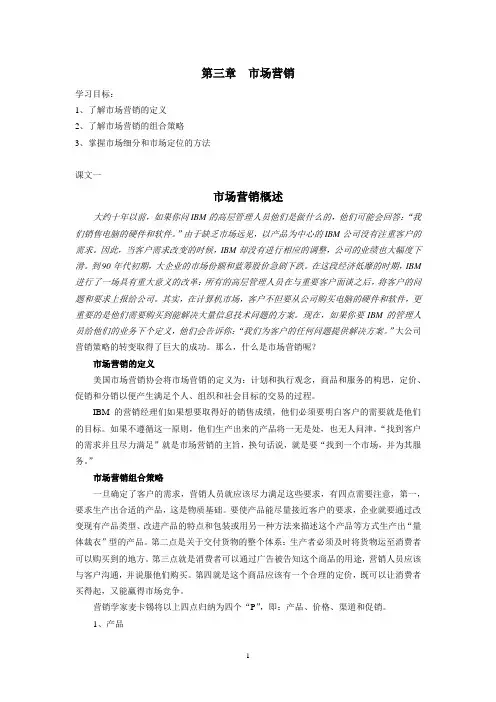
第三章市场营销学习目标:1、了解市场营销的定义2、了解市场营销的组合策略3、掌握市场细分和市场定位的方法课文一市场营销概述大约十年以前,如果你问IBM的高层管理人员他们是做什么的,他们可能会回答:“我们销售电脑的硬件和软件。
”由于缺乏市场远见,以产品为中心的IBM公司没有注重客户的需求。
因此,当客户需求改变的时候,IBM却没有进行相应的调整,公司的业绩也大幅度下滑。
到90年代初期,大企业的市场份额和蓝筹股价急剧下跌。
在这段经济低靡的时期,IBM 进行了一场具有重大意义的改革:所有的高层管理人员在与重要客户面谈之后,将客户的问题和要求上报给公司。
其实,在计算机市场,客户不但要从公司购买电脑的硬件和软件,更重要的是他们需要购买到能解决大量信息技术问题的方案。
现在,如果你要IBM的管理人员给他们的业务下个定义,他们会告诉你:“我们为客户的任何问题提供解决方案。
”大公司营销策略的转变取得了巨大的成功。
那么,什么是市场营销呢?市场营销的定义美国市场营销协会将市场营销的定义为:计划和执行观念,商品和服务的构思,定价、促销和分销以便产生满足个人、组织和社会目标的交易的过程。
IBM的营销经理们如果想要取得好的销售成绩,他们必须要明白客户的需要就是他们的目标。
如果不遵循这一原则,他们生产出来的产品将一无是处,也无人问津。
“找到客户的需求并且尽力满足”就是市场营销的主旨,换句话说,就是要“找到一个市场,并为其服务。
”市场营销组合策略一旦确定了客户的需求,营销人员就应该尽力满足这些要求,有四点需要注意,第一,要求生产出合适的产品,这是物质基础。
要使产品能尽量接近客户的要求,企业就要通过改变现有产品类型、改进产品的特点和包装或用另一种方法来描述这个产品等方式生产出“量体裁衣”型的产品。
第二点是关于交付货物的整个体系:生产者必须及时将货物运至消费者可以购买到的地方。
第三点就是消费者可以通过广告被告知这个商品的用途,营销人员应该与客户沟通,并说服他们购买。

I.The style of a resume must be direct and simple. T o omit pronouns and otherstechniques are very effective. Rewrite the following sentences in Resume.1.Developed new territory.2.Developed computer programs to monitor accounting systems including carefully writtendocumentation manuals that enabled users to operate these sophisticated systems effectively. 3.Managed operations of store with sales volume of $1,000,000 and supervised eightemployees.4.Earned average of $35,000--$55,000 a year in commissioned earnings. Received serviceaward for exceeding sales quota of three years employed.5.Developed effective interpersonal skills through involvement in student organizations such asthe Student Council…II.Fill in the blanks with your information and improve your own resume. (Omitted)III.Write a resume according the following information.1. Wang MinClass 97081Computer Science and Engineering CollegeSoutheast UniversityNanjin, Jiangsu, 210002(025) 3847-9238EDUCA TIONSoutheast University Nanjin, JiangsuBachelor of Science in Computer 1997-2001·GPA: 90/100·V ice President of the Southeast University Student Council responsible for academic research·Active member of the University Society of Electronics·Director of the University Association of Computer Science·Winner of the University Scholarship in every academic year·Winner of the Panda Prize for Excellent Students in 1998·MCSE Certificate in 1999·Author or tow research papers on the programming in the Southeast University JournalExperienceZHONGJI DEVELOPMENT COMPANY Nanjin, JiangsuIntern Engineer 1/2001 – Present·Install hardware and software for customers·Wrote programs in the Traffic Computerization Project of Nanjin·Received the Internship A ward from the Southeast UniversityJINDIAN COMPANY Nanjin, JiangsuPart-time Salesperson and Engineer Summer, 1998·Sold computers·Repaired computersENGLISH PROFICIENCY·Scored 630 on TOEFL in January 1999·Good at English listening, speaking, reading, and writing·Excellent technical communication skills in EnglishREFERENCESProf. Y ang Huan, Computer Science and Engineering College, Southeast University, Nanjin, Jiangsu 210042 (025) 8736-2673President Kong Lin, Zhongji Development Company, 12 South Section, Ring Road One, Nanjin, Jiangsu, 210005 (025) 3364-2564Mr. Han Fei, CEO, Jindian Company, 73 People’s Road, Nanjin, Jiangsu 210013 (025) 5574-7364Wang Min。